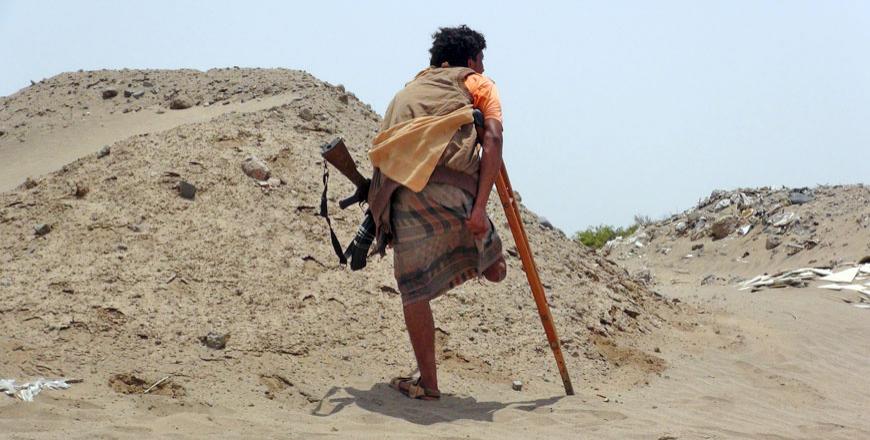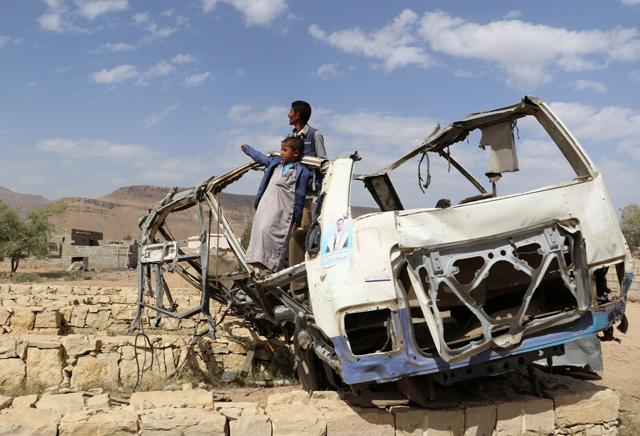You are here
With Scud launch, Yemen’s Saleh shows his hand ahead of talks
By Reuters - Jun 09,2015 - Last updated at Jun 09,2015
DUBAI — By launching a scud missile at Saudi Arabia, Yemen's former president Ali Abdullah Saleh has sent a signal that he needs to be a factor at upcoming peace talks in Geneva aimed at ending two months of war.
Saleh, the strongman who resigned following the 2011 "Arab Spring" protests after more than three decades in power, has emerged as the main military ally of Houthi Shiite fighters, now the most powerful force in the country.
Saudi Arabia has been targeting the Houthis for two months from the air in support of the government led by Saleh's successor, Abed Rabbo Mansour Hadi, who evacuated the country in the face of a Houthi advance.
The Saudi campaign, joined by other Sunni Muslim powers, is aimed in part at sending a message to the Houthis' main backers, Shiite Iran.
But Yemen watchers say the country's remaining Scuds are in the hands of Saleh and military units under his command, not the Houthi fighters that he has supported.
By firing one of the missiles on Saturday and stepping up heavy artillery attacks on border positions in battles that have killed at least six Saudi soldiers since Friday, the old master has sent a message ahead of the talks which start on Sunday, reminding Riyadh that the war won't end without him.
"The border attack was an attempt to demonstrate his strength as Yemen's top military force, maximise his influence at Geneva and give him the upper hand," said Farea al-Muslimi, a researcher at the Carnegie Middle East Centre.
The Scud targeted the largest air base in southern Saudi Arabia, the first time in the conflict that Yemeni forces have used a missile capable of hitting targets so deep in the kingdom. It was shot out of the sky by Saudi patriot missiles.
"The Houthis themselves are not yet well-trained enough to fire a missile like that. The skill and expertise needed to operate the missile and target an air base are probably only present in the rump of Saleh's army," said Michael Elleman, a senior fellow at the International Institute for Strategic Studies (IISS).
Missile message
Saleh, himself a member of the Houthis' Zaydi Shiite minority sect which ruled a thousand year kingdom in North Yemen until 1962, tried to crush the Houthis while in power. Saudi Arabia helped him during a 2009 war with the fighters.
But after giving up power to Hadi in a deal brokered by Saudi Arabia and its allies, Saleh quietly formed an alliance with the fighters. Military units loyal to him stood by, refusing to defend Hadi while the Houthis captured the capital last year.
The border fighting in recent days has seen military units still loyal to Saleh take a far more aggressive role on the battlefield.
Saudi officials had previously boasted that their air campaign destroyed Yemen's cache of ballistic missiles capable of striking the Kingdom's cities. By firing one, Saleh's forces have demonstrated that the campaign has not wiped out that capability.
The Scud launch was paired with an artillery assault on the border which Saudi-owned al-Arabiya TV said was confronted with air strikes and helicopter fire in a battle lasting ten hours.
The fighting seems aimed at changing military calculations in Riyadh before the talks that begin on Sunday. Saudi commanders had prepared for an assault on the Houthis to teach Iran a lesson, rather than a war against Yemen's army.
"The Saudi objectives in Yemen appear more about standing up to Iran and showing that it will fight back if it tries to expand its influence in the Arab world," said Elleman.
Firing the Scud proves that Hadi's Saudi-backed government never wrested control of the most powerful military units from Saleh.
"Ever since 2011 when power was transferred to Hadi, he worked to gain control over the strategic missiles, and especially the strategic Scud missiles. But the will of our heroic men and forces allowed them to take back this supply," Brigadier General Sharaf Luqman, a spokesman for forces loyal to Saleh, told the Houthi TV channel al-Masira on Saturday.
"We've sent a message, with a single Scud, to the Saudi-Zionist enemy so it understands what to expect as a result of its excess and arrogance," he said.
Arab air strikes on missile stores throughout the country have killed at least 100 people in over two months as the bombings set off huge secondary explosions that sent munitions flying into the air and crashing into civilian areas.
The Saudi-led alliance's spokesman, Brigadier General Ahmed Asseri, has previously said the campaign succeeded in neutralising the threat of Yemen's missiles. He rowed back on Saturday, saying 80 per cent of Yemen's estimated arsenal of 300 Scuds had been destroyed.
Related Articles
DUBAI/SANAA — Yemen's dominant Houthi group and its army allies fired a Scud missile at Saudi Arabia which the kingdom said it shot down on
RIYADH — Saudi Arabia said it shot down a ballistic missile, fired by Yemeni rebels, southwest of the capital Riyadh late Friday, ahead of U
SANAA — Yemen's war pits a disparate camp of government loyalists and southern separatists backed by a Saudi-led coalition against Iran-alli
















